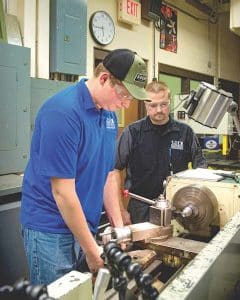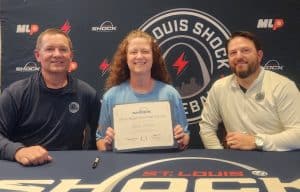New program forms future machinists

Southwestern Illinois College and Red Bud High School have joined to train for a well-paying profession in great demand.
RBHS has become an extension of SWIC’s precision machining technology program.
Although high school students have been able to take shop classes during regular school days and can earn dual credits that are applied toward a college degree, in this program they can also add night classes that accelerate the process.
Community members may also join these evening classes.
The high school has numerous manual machines in its industrial technology program and is acquiring computer numerical control machine tools that will enable classes now offered only at SWIC’s Sam Wolf Granite City campus to be available in Red Bud.
The evening program in Red Bud began in August with four students – one from RBHS and three community members – enrolling in basic and more advanced manual machine tooling classes.
These are full-fledged college classes, for which they must pay tuition and which can lead to an associate’s degree in precision machining technology.
Although the initial class size is small, there’s hope numbers will increase as word gets out that these classes are available.
RBHS industrial technology instructor Jared Piel said the evening classes are open to everyone –including those who wish to be introduced to machine tooling with no definite future occupation in mind.
The overall program is headed up by Mark Bosworth, coordinator for precision machining technology at SWIC.
Piel, a 2000 RBHS graduate, and Bosworth have crossed paths before, first at Ranken Technical College in St. Louis, where Bosworth taught, and later at SWIC.
They are able to share a smooth exchange of ideas and skills that benefit everyone invloved.
Piel said the program is receiving “amazing support” from school board members, administrators, counselors, teachers and industry.
“They have taken field trips to businesses that utilize machine tooling and have developed a greater understanding for the field and its requirements. Getting general education teachers to see and understand how their programs and precision machine tooling work together has been a valuable accomplishment to gain student interest in the classroom so students can see the connection of general education curriculum to real life application,” he said.
That’s a difficult thing to gain, Bosworth said.
“If you ask most people what a salesperson does, they can tell you a lot. But if you ask the same question about what a machinist does, you will get very short answers or questioning stares,” he said.
Both teachers pointed out that precision machine technology is the very foundation of virtually everything used daily.
Machinists cut parts from pieces of metal. They create dies used to make other parts, metal and otherwise. They operate large machines that fabricate thousands of individual parts, miles or countries apart, that come together to become automobiles, airplanes, conveyor belts or basic items like hammers or screwdrivers.
Several Red Bud firms have shown support for the program as a source of trained, skilled employees they may compete for. And their open house field days are adding weight to that story.
“We recently visited a company in Missouri that had a precision computer-controlled machine the size of our classroom,” Bosworth said.
They said they had work lined up for this machine for three years, but they needed no fewer than 16 trained precision machinists with a host of computer skills to operate it. Those jobs start between $15 and $25 an hour.
When he started in the field, Bosworth said maybe five percent of machinists were engaged in computer or numerical control work.
“Today that figure has flip-flopped. There are still manual precision machine tools in most shops, but almost all work is being done by computer controlled machines — and of course, that’s where the jobs are,” he said.
He said this program is open to Missouri students at the same cost as students in Illinois.
One of the initial four students at the Red Bud campus is Gavin Christensen, a 17-year-old RBHS senior. With dual credit and now regular evening classes, he has accumulated five college-level classes in machine tooling and is well on his way to an associate’s degree in applied science while still in high school.
“I took an initial class here at the high school. I was intrigued and enjoyed it,” he said. “I really want to stay and work in this area and there are many opportunities for skilled machinists, both in Red Bud and nearby.”
Christensen told his story as he and Piel discussed the proper set-up on a metal working lathe, of a part identified in a precision drawing as a “conveyor shaft.”
As each step in forming the part from an initial piece of solid rod stock proceeded, the part’s location had to be precisely set using micrometers and repeated measurements. Then the correct cutting tools to size and taper the final part, as well as to place a precision thread for attaching it to a machine, had to be applied properly with correct feed rates and rotation speeds of the lathe.
Piel said the school has a full assortment of manual precision machine tools for introductory classes and they hope to add more computer-controlled precision tools to a small number already in the school’s machine shop.
Bosworth said they are exploring ways to acquire these higher technology tools and eventually hope to have all capabilities currently available at SWIC’ Granite City campus in Red Bud.
“The two locations are an hour apart and there are a lot of jobs within 25 miles,” Bosworth added.
Persons interested in learning about opportunities in the field of precision machine tooling may call 866-942-7942, ext. 7457, or 618-282-3826, ext. 1165.






